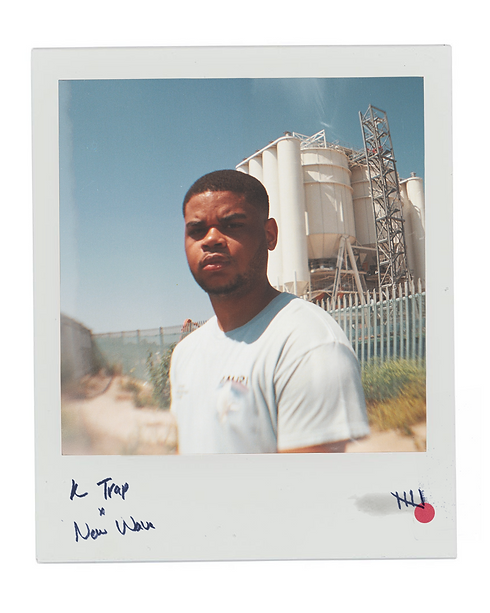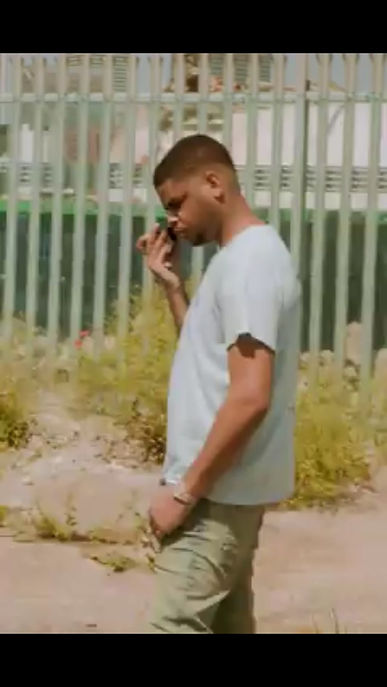
K-Trap Sends Shivers Down The Rap Game's Spine
“Alexa, run some riddims” K-Trap raps over the resonant baselines of his latest single ‘Shivers’. The 24 year old South London drill rapper is known for his combative, hedonistic word play and with over 500,000 regular monthly listeners on Spotify and a combined social following of over 200,000, his impact on the culture is unequivocal. Signed to Sony Music’s imprint label black butter records, (alongside the likes of J Hus and Octavian) K-Trap’s music embodies some of the gritty, harsh realities of the South London experience as well as the silver lining of success that he’s adapted into.
After featuring on Amazon’s “Ones to Watch” list at the start of the year and the success of his latest release ‘shivers’, Amazon have curated a voice command for the track on Alexa. When commanded to ‘Run Some Riddims’, Alexa will play ‘Shivers’.
On a hot summer's day K-Trap sports his baby blue Amiri T-shirt and we sit in the front of his car. His presence is much more calming than you’d expect. His demeanor and energy were cool and relaxed, yet confident.
Interviewer Thelma Khupe
Direction Derrick Odafi
Photography Diego Martinez Chacon & Kareem Abdul
Grooming Blessing Kambanga
Videography ArmzyBAM & Tufael Kaibiri
Project Manager Matilda Sandi
Special Thanks to Satalite 414
NW: How did you come up with the name K-Trap?
KT: I had another street name I used to go by when I was younger which began with a K. As I got older my life began to change and I didn't really want that name anymore. I kept the ‘K’ and then ‘Trap’ just came to me naturally.
NW: Which artists did you listen to growing up, have any of these influenced your music today?
KT: I don't know names off the top of my head, but with me, I listen to all types of music, I give everything a chance.
The 24 year old rapper was raised in Gipsy Hill, an area in south London within the London Borough of Lambeth that borders the London Boroughs of Southwark and Croydon. ‘Growing up on any estate in Lambeth, yeah that played a big part in my music because I speak about my experiences a lot.’
‘KT: I've always liked music. I've always done it. I've loved music as a whole and not just rapping. I've never used to sit down and think 'yeah. I want to be a rapper.' I just started rapping.
And the music scene is a bit different now, you can actually see a future with it. I've just adapted to it.’
After the release of ‘David Blaine’ in 2017, K Trap’s success rocketed and he started to turn the heads of almost everyone in the industry. He went from a local, slow rising rapper to one of Drill music's most notable pioneers.
NW: A lot of people say this is the song that kick started your career. Do you agree? And did you anticipate the level of success it received?
KT: It did kickstart my career, I got a lot of love and a lot of support from early. I couldn't tell you that I definitely saw that it was going to happen. I didn't think I was going to get lost in a mess, I thought it was just going to get blown over. I feel like I'm a hard rapper so yeah it's great homage.’

When I started rapping and I wore the mask, I was just going through certain challenges in life and I just wasn't really too ready to expose myself. That's why I wore the mask.

NW: Last year in June, you released the music video to your song ‘Big Mood’ where you finally took off your mask for the first time. What made you decide to take it off?
KT: When I started rapping and I wore the mask, I was just going through certain challenges in life and I just wasn't really too ready to expose myself. That's why I wore the mask. When I was at the stage where I was working on ‘Big Mood’, a lot of stuff had changed in my life. I was getting to that stage where I just didn't really want that look anymore. There was no need for that. Like nowadays, you see a lot of artists and rappers coming out wearing a mask or covering their face, but there's no reason behind that. That's not why I did it. I didn't do it for that image or to look scary or anything, if that's what people thought. I did it for a valid reason. And that reason is invalid now so it's time to take it off.’
NW: Wearing a mask or some form of face covering has quickly become a recurring theme in UK drill music. Do you think that you have influenced this trend where rappers are not wearing masks?
KT: Of course. I set the trend if I'm being honest. The only person I acknowledged who was already doing that was LD from 67. After that came me, I covered my face. Then I think M Huncho and RV followed. Those are people who've been covering their faces from the beginning and everyone else just came in after.
NW: You reference fashion in your music often. How would you describe your style and aesthetic?
KT: I'm quite plain, but I like what I like. I like designer brands and stuff, but I'm not really loud in the sense that I don't like wearing lots of colours. I'm a 'less is more' kind of guy. And I only wear certain stuff, I don't just wear anything and everything.
NW: One of the things you’re known for is your use of adlibs in a way that's creative, entertaining and authentic to you. How do you come up with them?
KT: They literally just pop up, I don't think too much about it. Everything just sort of comes fluently, there's not much to it.
NW: You are considered one of the torch bearers of UK drill, pioneering the sound and pushing it to the forefront to be as successful as it is today. But you’ve also illustrated your artistic versatility with songs like ‘Different’ and ‘Change’ that show you can do more than just drill. How would you describe your current sound and how has this evolved?
KT: Drill is what I came out doing and what I do best. But at the same time, I'm an artist so you can expect anything from me. I like to keep the fans happy so I give them, so I'll give them drill or what they like. But there might be a time you hear K trap on song trying something different.
On his growth, K Trap expresses the importance of his growth both mentally and on the business side of things. ‘I've taken a bit of time out to understand myself more when it comes to that stuff.’
NW: You have an impressive discography of collaborations from the likes of Headie One to Nafe Smallz, RV and Donae’o. Which collaboration has been your favourite and why?
KT: I like working with Headie One, I feel like we’re similar and bounce off each other well. Nafe Smallz too, that was a different style of song for me and I liked what he did with it. I enjoy all my features.
NW: Both in the UK and internationally. Which other artists would you look to collaborating with?
KT: I feel like in the U.K. I haven't really made a lot of things happen collaboratively. I've just been focused on doing me, but now I'm about to collaborate more. So you'll see a lot more of that. In the US, there’s a rapper called No Cap. I rock with him hard.

Expect a lot of noise. I feel like I’ve been quiet for lots of reasons but yeah just expect a lot of noise.


NW: Drill music in particular and a lot of the music you make is a reflection of surroundings, environment, and circumstances. What is your response to people accusing drill music of ‘glorifying street life’ when this is just the life you’ve been exposed to?
KT: It’s people's reality. A lot of people make music about what they’re exposed to or their reality. That’s what it is.
NW: 2020 has been branded the year of learning, an eye-opening year for many. You tweeted a few weeks ago that ‘A lot of people are uneducated, even myself. I’ve learned a lot from people's posts’. What are some of the biggest lessons you’ve learned this year?
KT: Prepare for the worst, exactly that.
I put that tweet out because sometimes people take other people's silence for ignorance or that they’re not behind something, they take it as a bad thing. But sometimes people aren’t as educated as others. So people, even myself, would rather stay quiet on certain stuff that I’m not educated about because I don’t want to say the wrong thing. Don’t always think that just because someone hasn't spoken out that it’s a negative thing, because most of the time it’s not.
NW: Women's rights, specifically assault against women, has been a topic of discussion in the past week, some female rappers have also voiced their experiences. What do you think men in the music industry specifically can do or are doing to ensure that their female counterparts are protected?
KT: I don't really want to speak on that but I can tell you that I fully respect women, I don't agree with disrespecting women. It's not in my world.
NW: What can we expect from you for the rest of 2020?
KT: Expect a lot of noise. I feel like I’ve been quiet for lots of reasons but yeah just expect a lot of noise.